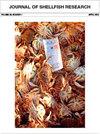东部牡蛎种群的有效表面积和从大量死亡中恢复的潜力,以及珊瑚礁恢复的关键时期
IF 1
4区 农林科学
Q3 FISHERIES
引用次数: 0
摘要
牡蛎礁是大多数河口碳酸钙的主要来源,这些珊瑚礁提供的栖息地复杂性支持了河口生物的多样性。牡蛎礁上坚硬基质的可用表面积对种群维持至关重要,因为这种基质为新生牡蛎的定居提供了栖息地。在天然珊瑚礁上,可供贝虫定居的主要基质包括活牡蛎、箱(死的关节阀)和培养皿(单个牡蛎壳和壳碎片)。从2016年2月到2020年10月,一个长期的牡蛎监测项目的数据被用来生成一个每月的时间序列,该序列显示了密西西比海湾四个珊瑚礁上的活牡蛎、箱子和孵化物所贡献的碳酸盐总重量的百分比。这些百分比在空间和时间上有所不同。当珊瑚礁健康时,活牡蛎占总碳酸盐的大部分。在研究期间,发生了两次大规模死亡事件。在2016年的死亡事件之后,在所有取样的珊瑚礁中,贡献大部分碳酸盐的基质从活牡蛎转变为孵化物。在死亡事件发生后,三个珊瑚礁表现出适度的种群恢复,但在2019年受到第二次更严重的大规模死亡事件的影响。在所有珊瑚礁中,箱形礁每克碳酸盐中通常有最多的唾液。通过比较每种基板的可用表面积和沉淀在每种基板上的唾液数量,计算每种基板的潜在表面积(PSA)。产生校正因子来解释幼虫定居偏好,并用于借记或贷记PSA来计算每种基质类型的有效表面积(ESA)。在帕斯克里斯蒂安珊瑚礁Cultch的ESA最高,在亨德森角和桥之间珊瑚礁Cultch的ESA高于箱形ESA。在圣路易斯湾,box ESA是cultch的两倍。这些结果表明,在调查时间框架内,该地区牡蛎丰度低,非周期性大量死亡的条件下,培养皿和箱型是比活牡蛎更有价值的沉降基质。在不平衡的生态系统中,活牡蛎的生态系统数量不足,这代表了一种不健康的状况,并表明在大量死亡后,珊瑚礁恢复存在一个关键时期,在这个时期,箱形生态系统的增加和幼虫的可得性的及时巧合对于从大量死亡中快速恢复至关重要。本文章由计算机程序翻译,如有差异,请以英文原文为准。
Effective Surface Area and the Potential for Recovery from Mass Mortality in Eastern Oyster Populations, with a Vignette on the Critical Period For Reef Recovery
ABSTRACT Oyster reefs are a primary source of calcium carbonate in most estuaries and the habitat complexity provided by these reefs supports a diversity of estuarine life. The available surface area of hard substrate on an oyster reef is critical for population maintenance, as this substrate provides habitat for the settlement of new oyster recruits. On natural reefs, the primary substrates available for settlement by spat include live oysters, boxes (dead articulated valves), and cultch (single oyster shells and shell fragments). Data from a long-term oyster monitoring program from February 2016 to October 2020 were used to generate a monthly time series of the percent of total carbonate weight contributed by live oysters, boxes, and cultch at four reefs in the Mississippi Sound. These percentages vary spatially and temporally. When reefs were healthy, live oysters dominated the total carbonate. During the study period, two mass mortality events occurred. Following the 2016 mortality event, the substrate contributing the majority of the carbonate shifted from live oysters to cultch at all reefs sampled. Three reefs exhibited a modest population recovery following the mortality event only to be impacted by a second, more severe mass mortality event in 2019. Boxes usually had the highest number of spat per gram carbonate at all reefs. The potential surface area (PSA) of each substrate type was calculated by comparing the available surface area of each substrate type and the number of spat that settled on each substrate. Correction factors were generated to account for larval settlement preferences and used to either debit or credit the PSA to calculate effective surface areas (ESA) for each substrate type. Cultch offered the highest ESA at Pass Christian, and cultch ESA was higher than box ESA at Henderson Point and Between Bridges reefs. At Bay St. Louis, box ESA was twice that of cultch. These results suggest cultch and boxes are more valuable settlement substrates than live oysters in this region under the conditions present during the survey time frame, which was characterized by low oyster abundance and aperiodic mass mortality. The unbalanced ESA, in which live oyster ESA is underrepresented, represents an unhealthy condition and demonstrates that a critical period exists for reef recovery after mass mortality in which the timely coincidence of increased box ESA and larval availability is essential for rapid recovery from mass mortality.
求助全文
通过发布文献求助,成功后即可免费获取论文全文。
去求助
来源期刊

Journal of Shellfish Research
生物-海洋与淡水生物学
CiteScore
2.30
自引率
0.00%
发文量
40
审稿时长
6 months
期刊介绍:
Original articles dealing with all aspects of shellfish research will be considered for publication. Manuscripts will be judged by the editors or other competent reviewers, or both, on the basis of originality, content, merit, clarity of presentation, and interpretations.
 求助内容:
求助内容: 应助结果提醒方式:
应助结果提醒方式:


